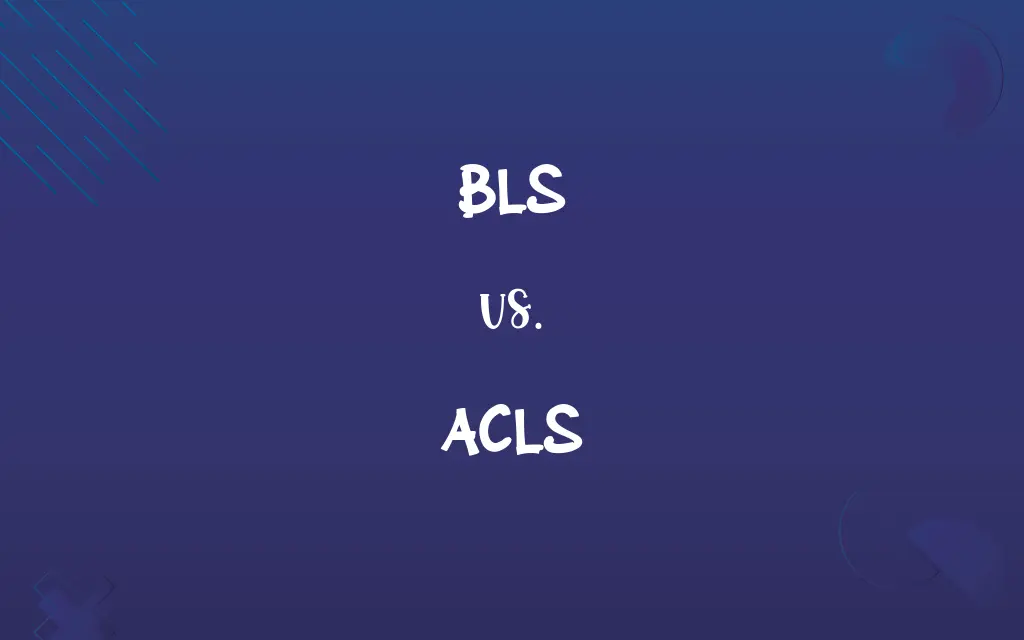BLS vs. ACLS: Know the Difference

By Shumaila Saeed || Published on February 25, 2024
BLS (Basic Life Support) is for stabilizing patients with life-threatening injuries or illnesses, while ACLS (Advanced Cardiac Life Support) involves more complex skills for cardiac emergencies.

Key Differences
BLS, or Basic Life Support, is a fundamental medical care procedure aimed at sustaining life in emergency situations, primarily through CPR and basic airway management. ACLS, or Advanced Cardiac Life Support, on the other hand, involves more specialized interventions, such as drug administration and advanced airway management, specifically for cardiac arrest and other heart-related emergencies.
Shumaila Saeed
Feb 25, 2024
The training for BLS is generally intended for a broader audience, including laypeople and healthcare professionals, focusing on immediate response techniques like chest compressions and rescue breathing. ACLS training, in contrast, is designed for healthcare professionals with a duty to respond to cardiovascular emergencies, delving into detailed cardiac care protocols and equipment usage.
Shumaila Saeed
Feb 25, 2024
In terms of application, BLS acts as the foundation of emergency medical response, applicable in a wide range of emergencies, including drowning, choking, or sudden cardiac arrest. ACLS expands upon these BLS skills, adding layers of complexity with skills like reading and interpreting electrocardiograms (ECGs), administering IV drugs, and managing advanced airways.
Shumaila Saeed
Feb 25, 2024
Certification requirements also differ: BLS certification can often be obtained after a short course, making it accessible for non-medical personnel. ACLS certification, however, requires a more extensive medical background and understanding of complex medical concepts, as it deals with specific cardiac emergency protocols.
Shumaila Saeed
Feb 25, 2024
BLS can be seen as the first line of defense in emergency care, where immediate action can save lives without the need for advanced equipment. ACLS is more of a second line, where advanced skills and knowledge are necessary to manage specific, often critical, cardiac conditions.
Shumaila Saeed
Feb 25, 2024
ADVERTISEMENT
Comparison Chart
Typical Responders
General public, healthcare professionals
Healthcare professionals specializing in cardiac care
Shumaila Saeed
Feb 25, 2024
Core Skills
CPR, airway management
Drug administration, ECG interpretation, advanced airway management
Shumaila Saeed
Feb 25, 2024
ADVERTISEMENT
Training Requirement
Short course, broader audience
Extensive, medical background needed
Shumaila Saeed
Feb 25, 2024
Certification Renewal
Frequently, to stay current
Regular updates due to advanced nature
Shumaila Saeed
Feb 25, 2024
BLS and ACLS Definitions
BLS
BLS is a primary medical care approach for patients in critical conditions.
The first responders used their BLS training to manage the victim's airway until more help arrived.
Shumaila Saeed
Jan 18, 2024
ACLS
ACLS involves comprehensive management of cardiac emergencies.
His ACLS skills were crucial in interpreting the patient’s ECG during the cardiac arrest.
Shumaila Saeed
Jan 18, 2024
ADVERTISEMENT
BLS
BLS is the foundational skill set for emergency medical care.
BLS procedures are often the first step in medical intervention during an emergency.
Shumaila Saeed
Jan 18, 2024
ACLS
ACLS builds upon basic life support skills with a focus on heart-related emergencies.
ACLS training is essential for healthcare workers in cardiac intensive care units.
Shumaila Saeed
Jan 18, 2024
BLS
BLS stands for Basic Life Support, focusing on immediate life-saving techniques.
During the emergency, the paramedic performed BLS procedures to keep the patient stable.
Shumaila Saeed
Jan 18, 2024
ACLS
ACLS is designed for healthcare professionals dealing with complex cardiac conditions.
The doctor’s ACLS certification was evident in her efficient management of the cardiac emergency.
Shumaila Saeed
Jan 18, 2024
BLS
BLS is essential for anyone responding to life-threatening medical emergencies.
The lifeguard’s BLS skills were crucial in saving the drowning child.
Shumaila Saeed
Jan 18, 2024
ACLS
ACLS stands for Advanced Cardiac Life Support, focusing on sophisticated cardiac care.
The nurse’s ACLS training enabled her to administer life-saving drugs during a heart attack.
Shumaila Saeed
Jan 18, 2024
BLS
BLS encompasses techniques like CPR and basic airway management.
As part of her BLS certification, she learned how to effectively perform chest compressions.
Shumaila Saeed
Jan 18, 2024
ACLS
ACLS includes advanced techniques like drug administration and ECG interpretation.
ACLS protocols guided the medical team in choosing the right medication for the arrhythmia.
Shumaila Saeed
Jan 18, 2024
Repeatedly Asked Queries
What is BLS?
BLS, or Basic Life Support, involves fundamental medical techniques to address life-threatening conditions.
Shumaila Saeed
Feb 25, 2024
Who can learn BLS?
BLS is suitable for both the general public and healthcare professionals.
Shumaila Saeed
Feb 25, 2024
How often do you need to renew BLS certification?
BLS certification typically needs renewal every two years.
Shumaila Saeed
Feb 25, 2024
How long does ACLS certification last?
ACLS certification generally lasts for two years.
Shumaila Saeed
Feb 25, 2024
Is BLS only for cardiac emergencies?
No, BLS applies to a range of emergencies, not just cardiac.
Shumaila Saeed
Feb 25, 2024
Do BLS and ACLS certifications require practical exams?
Yes, both certifications typically require passing practical skills tests.
Shumaila Saeed
Feb 25, 2024
What are the key components of BLS?
The key components include CPR, airway management, and initial patient assessment.
Shumaila Saeed
Feb 25, 2024
Is CPR a part of both BLS and ACLS?
Yes, CPR is a fundamental part of both BLS and ACLS.
Shumaila Saeed
Feb 25, 2024
Can BLS training be done online?
Yes, the theoretical part of BLS can be done online, but practical assessment is usually in-person.
Shumaila Saeed
Feb 25, 2024
Does ACLS include pediatric emergency protocols?
ACLS mainly focuses on adults, but it may include some pediatric aspects.
Shumaila Saeed
Feb 25, 2024
What is ACLS?
ACLS, or Advanced Cardiac Life Support, is a set of clinical interventions for the urgent treatment of cardiac arrests and other cardiac emergencies.
Shumaila Saeed
Feb 25, 2024
What additional skills does ACLS include over BLS?
ACLS includes drug administration, advanced airway management, and ECG interpretation.
Shumaila Saeed
Feb 25, 2024
Who should take ACLS training?
ACLS is primarily for healthcare professionals like doctors, nurses, and paramedics.
Shumaila Saeed
Feb 25, 2024
Can BLS be used in drowning cases?
Yes, BLS techniques are applicable in drowning situations.
Shumaila Saeed
Feb 25, 2024
Can someone with BLS certification perform advanced airway techniques?
No, advanced airway management is usually beyond the scope of BLS and covered in ACLS.
Shumaila Saeed
Feb 25, 2024
Is a medical degree required for ACLS certification?
A medical degree isn't mandatory, but a solid medical background is essential.
Shumaila Saeed
Feb 25, 2024
Does ACLS training involve team coordination in emergencies?
Yes, ACLS emphasizes teamwork and communication in cardiac emergency settings.
Shumaila Saeed
Feb 25, 2024
Are there different levels of ACLS certification?
Typically, there's one standard ACLS certification, though courses might vary in depth.
Shumaila Saeed
Feb 25, 2024
Can a non-medical person take ACLS training?
Typically, ACLS is not recommended for non-medical personnel due to its advanced nature.
Shumaila Saeed
Feb 25, 2024
Is defibrillation covered in BLS training?
Yes, the use of automated external defibrillators (AEDs) is taught in BLS.
Shumaila Saeed
Feb 25, 2024
Share this page
Link for your blog / website
HTML
Link to share via messenger
About Author
Written by
Shumaila SaeedShumaila Saeed, an expert content creator with 6 years of experience, specializes in distilling complex topics into easily digestible comparisons, shining a light on the nuances that both inform and educate readers with clarity and accuracy.








































































